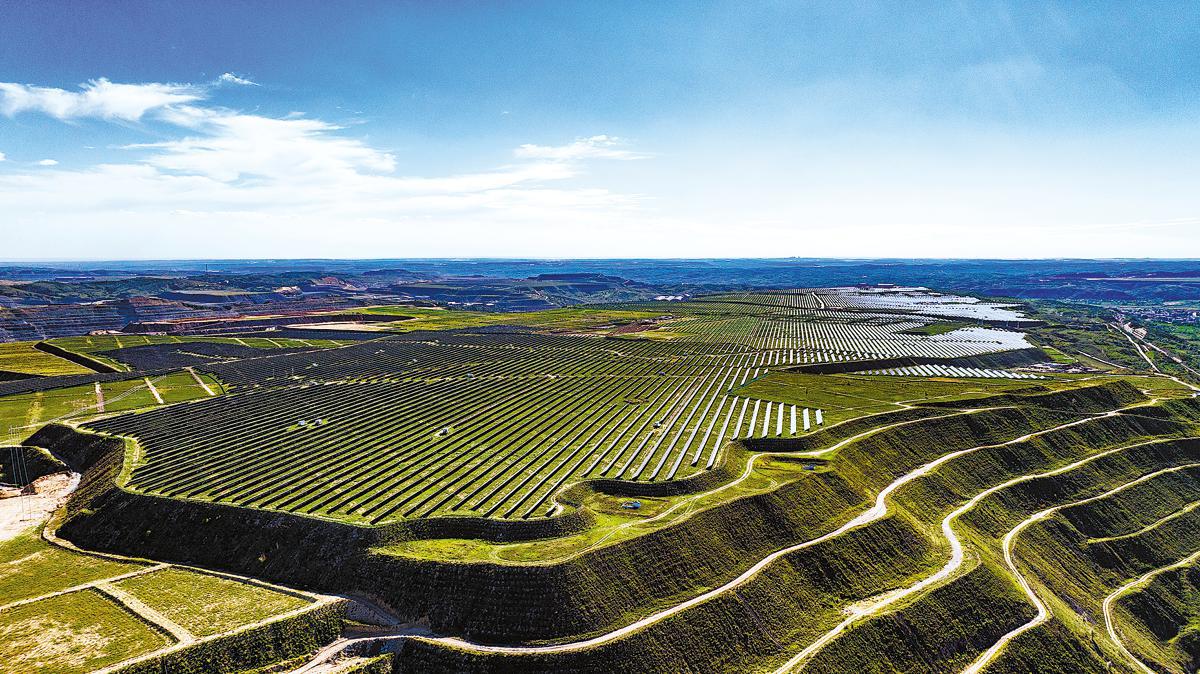
 0 Comment(s)
0 Comment(s) Print
Print E-mail China Daily, April 14, 2025
E-mail China Daily, April 14, 2025
Photovoltaic panels are installed on a reclaimed area of Changxu coal mine in Narisong, Inner Mongolia autonomous region, in August, 2024. [Photo/China Daily]
While renewable energy is playing an increasingly important role in China's green energy transition, coal mining still exists in some areas. In these areas, the government and local industry are taking steps to reduce the environmental impact, improve sustainable development and increase economic gains for local people.
In the coal-mining town of Narisong in the Inner Mongolia autonomous region, locals say that not only is the air quality improving, but their wallets are getting fatter, too.
The town of around 30,000 people has undergone five years of green reforms, which have seen its ecological landscape improve and economic growth increase.
In Narisong's 19 villages and two communities, collectives earned 14.4 million yuan ($2 million) in dividends last year alone, according to Hou Xianming, a member of the town's Party committee and chairman of the town's people's congress.
These dual gains stem from people-centered planning by the local government that started back in 2020. Back then, villages relying solely on mining struggled with unsustainable growth, while those without coal resources lagged behind. To holistically address ecological rehabilitation, sustainable industry development and income disparity, the government brought about the establishment of Juhe Industrial Co, Hou said.
The Juhe enterprise would carry out work associated with mitigating the environmental impact of mining, funded by villages and communities, according to government regulations.
The company also operates across sectors such as mine rehabilitation, environmental cleanup, equipment and land leasing, and waste management, said Hou.
Su Haixia, an official in the Ordos bureau of natural resources, said that mining companies must allocate funds for ecological restoration to local stakeholders. "Taking the green mine construction project as an example, coal companies must establish restoration funds and deposit about 90 million yuan per 10 million tons mined," Su said.
Subject to government evaluations on ecological restoration, coal mining companies could handle the restoration work themselves, or outsource such projects to specialized contractors like Juhe Industrial Co. With professional teams and flexible local hiring, these collaborations have facilitated the reclamation of almost 10,000 hectares of land in the town, according to Hou.
To date, Narisong has established 14 green mines — those that implement eco-friendly practices and technologies to reduce their environmental impact, with additional sites currently under evaluation, Hou said.
Juhe Industrial Co has also created 198 stable jobs for local people in property services alone, boosting the average annual income by nearly 40,000 yuan for those people, according to Hou.
"I was previously working in long-haul transportation far from home, but now I've been able to secure a job in my hometown, earning over 5,000 yuan a month with social security benefits — an opportunity I wholeheartedly cherish," said Liu Meijun, a truck driver from Yangshita village in Narisong.
Senior residents have also benefited. "Some villagers in their early 60s remain physically robust and mentally sharp and still seek employment, but urban companies reject them mainly based on age concerns," said Hou. "However, we've chosen to hire them for suitable light work — enabling them to care for elderly parents at home while earning an income, a win-win for families and the community."
Last year, Juhe Industrial Co generated 200 million yuan in revenue with a net profit of 36 million yuan. A total of 10 percent of those profits go toward emergency assistance for residents affected by natural disasters or severe medical hardships, 40 percent go to village collective dividends and 50 percent for the company's future development, according to Hou.
On the land that has been revitalized and recovered, solar farms are being set up, as well as medicinal herb cultivation.
A 1.95-billion-yuan 400-megawatt solar project has been established by Man Shi Group and Hanxia New Energy in Narisong. Occupying 652 hectares, the project leases 521 hectares from Wutumen village and 130 hectares from Wutugou village at 3,000 yuan per hectare, offering annual incomes of 1.56 million yuan and 390,600 yuan, respectively, for these communities.
These new industries have generated around 500 local employment opportunities, according to Hou.
"I work in the reclaimed area of Changxu coal mine, mainly maintaining and inspecting solar panels. After deductions for social security, I earn over 4,000 yuan a month. I also earn steady rental income from leasing my land to the companies — life keeps getting better and better," said Nie Jianjun, a villager from Wutumen village in Narisong.
Guided by government initiatives, villagers are enjoying diversified income streams ranging from collective equity dividends and wages to land rental money. Moreover, companies purchase saplings cultivated by locals for their land restoration efforts, with the profits from these sales further bolstering the community's financial well-being, Hou added.
| 什么补气血 | 血栓是什么 | 肝硬化是什么病 | 绚丽夺目的意思是什么 | 金木水火土各代表什么 |
| 父母宫代表什么 | 右手小拇指发麻是什么原因 | 大学没毕业算什么学历 | 石斛与什么搭配最好 | 美尼尔综合征吃什么药 |
| 什么是性生活 | 鸡属于什么动物 | 脑出血是什么原因造成的 | 万兽之王是什么动物 | 言字旁有什么字 |
| 蒟蒻是什么意思 | 脑震荡挂什么科 | 男人很man是什么意思 | 办理出院手续都需要什么 | 小孩嗓子哑了吃什么药 |
| cook是什么意思hlguo.com | 白什么什么hcv9jop5ns7r.cn | 祖宗是什么意思hcv8jop3ns1r.cn | 女性长期便秘挂什么科hcv9jop2ns4r.cn | 大姨妈可以吃什么水果hcv8jop6ns5r.cn |
| 缺钙应该吃什么hcv8jop1ns1r.cn | 怀孕了用排卵试纸测会显示什么hcv9jop3ns4r.cn | nba打铁是什么意思hcv7jop9ns8r.cn | 胡子发黄是什么原因hcv8jop6ns2r.cn | 有眼不识泰山是什么意思hcv7jop7ns2r.cn |
| 菲律宾货币叫什么hcv8jop3ns8r.cn | 什么书在书店里买不到hcv8jop1ns4r.cn | 工作性质是什么bfb118.com | 酸菜吃多了有什么危害hcv8jop8ns1r.cn | 威胁什么意思hcv9jop6ns8r.cn |
| 长期开灯睡觉有什么危害hcv9jop4ns3r.cn | hpv感染有什么表现hcv8jop3ns8r.cn | 乙肝有什么明显的症状hcv8jop6ns3r.cn | 工作单位是什么意思hcv7jop6ns5r.cn | 慢性胃炎是什么原因引起的liaochangning.com |
Go to Forum >>0 Comment(s)